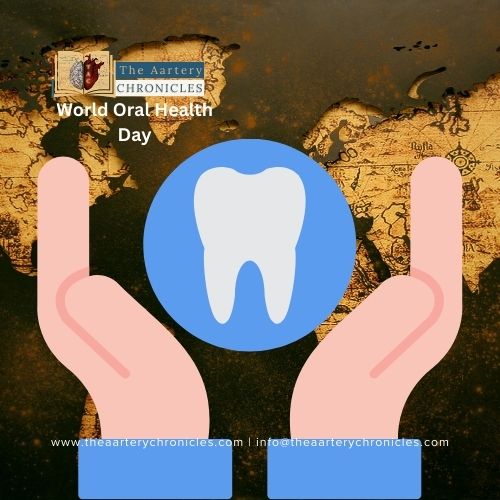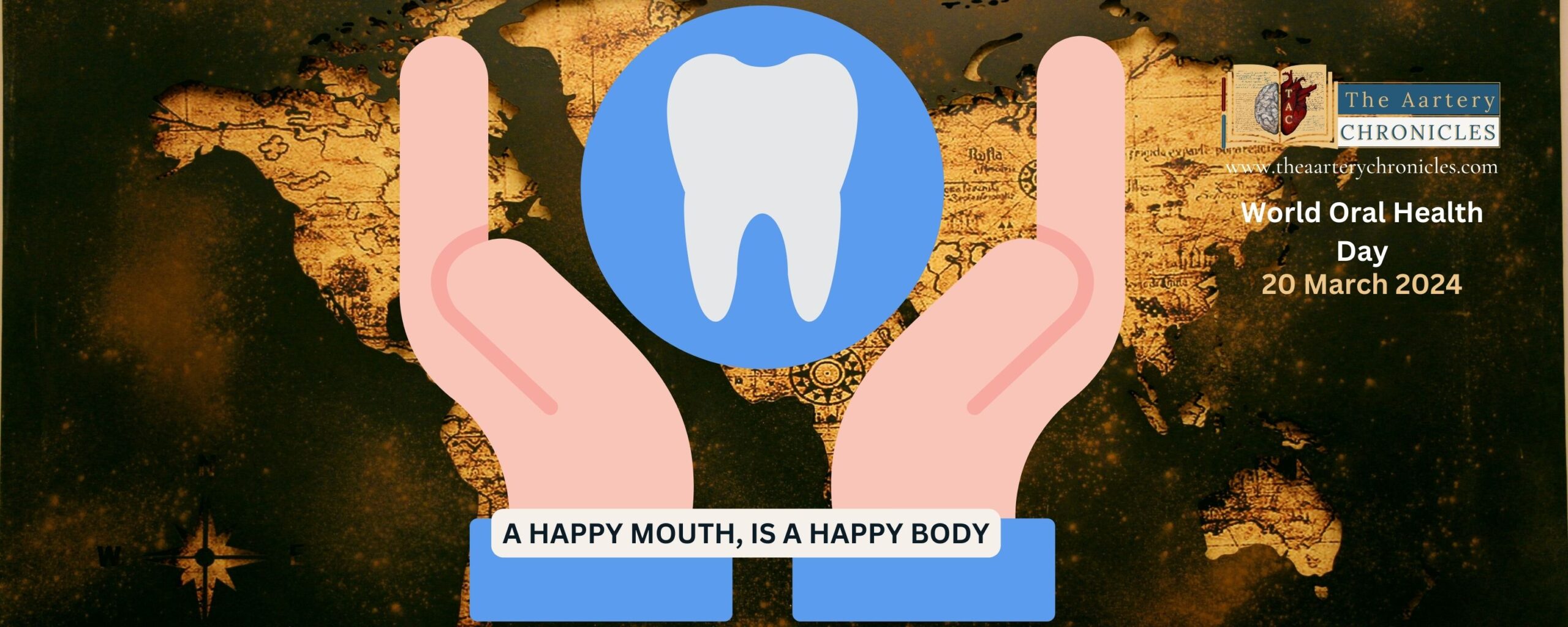

Celebrating World Oral Health Day 2024: A Happy Mouth, Is A Happy Body
World Oral Health Day, observed annually on March 20th, highlights the importance of oral health for overall well-being. Promoting prevention and access, this global initiative emphasizes the vital link between oral health and general health.
Every year on March 20th, the world comes together to celebrate World Oral Health Day, a global initiative dedicated to raising awareness about the importance of oral health and its impact on overall well-being. This day serves as a reminder that a healthy smile is not just a cosmetic asset but a gateway to better health and a higher quality of life.
The objective of World Oral Health Day is to advocate for oral health by raising awareness about the significance of dental issues and illnesses, and their associated risk factors, and promoting the adoption of appropriate oral hygiene practices.
Understanding Oral Health
According to the World Health Organization (WHO), oral health refers to the state of the mouth, teeth, gums, and related structures that enable individuals to perform essential functions such as eating, speaking, and swallowing without pain, discomfort, or disease. Beyond these physical aspects, oral health also encompasses the psychosocial aspects of well-being, including self-esteem and social interaction. [1]
It’s not just about having a radiant smile; it’s about feeling comfortable and confident in one’s own skin.
History of World Oral Health Day
The establishment of World Oral Health Day occurred in 2007 on September 12th, coinciding with the birthday of FDI founder Dr. Charles Godon. However, the campaign did not become fully operational until 2013, when the FDI World Dental Federation decided to change the date to March 20th.
The new date was selected to symbolise various oral health milestones, such as
- In order to be deemed healthy, elderly individuals must ideally retain a total of 20 natural teeth at the end of their lifespan.
- Children should ideally possess a full set of 20 primary (baby) teeth.
- In optimal health, adults should have a complete set of 32 teeth with no dental cavities
- Numerically expressed, these milestones translate to 3/20, hence the choice of March 20th as the new date for World Oral Health Day. [2]
The Theme of World Oral Health Day 2024
The World Dental Federation (FDI) revealed the three-year theme (2024 – 2026) for this year’s World Oral Health Day (WOHD): “A HAPPY MOUTH, IS A HAPPY BODY.”
The theme aims to promote awareness about the advantages of a happy, healthy mouth by emphasising the significance of the intricate link between oral health and general health. The initiative seeks to inspire individuals to appreciate and prioritise oral hygiene, recognizing that doing so can contribute to safeguarding their overall health and wellness. [3]

The theme of World Oral Health Day varies each year, focusing on different aspects of oral health. From promoting good oral hygiene habits to addressing common dental issues and emphasising the significance of the intricate link between oral health and general health, the theme aims to educate people of all ages about the importance of oral health care practices.
The Significance of World Oral Health Day 2024
World Oral Health Day is celebrated each year to mitigate the impact of oral diseases on the global population, healthcare systems, and economies. Oral diseases comprise a range of diseases and conditions, including
- Dental cavities
- Gum disease
- Tooth loss
- Oral cancer
- Oro-dental trauma
- Congenital issues like cleft lip and palate. [1]
The Link Between Oral Health and Overall Health
Poor oral health not only results in the onset of dental ailments, leading to pain, discomfort, social withdrawal, and diminished self-esteem, but it also directly influences an individual’s overall sense of well-being. Oral health is closely interconnected with general health in a variety of ways. Poor oral health can contribute to various systemic health issues, such as
- Cardiovascular diseases
- Diabetes
- Respiratory infections
- Adverse pregnancy outcomes
Additionally, oral infections and inflammation can exacerbate existing health conditions and compromise the body’s immune system. Conversely, good oral health habits can reduce the risk of developing certain systemic diseases and contribute to overall well-being. Therefore, maintaining optimal oral health is essential for promoting good general health and vice versa. [4]
Fortunately, there is no reason to endure such suffering because most oral health conditions are largely preventable and can be effectively treated when detected early.
Breaking Down Barriers by Empowering Communities
Oral diseases disproportionately impact the most vulnerable and marginalised populations. Individuals with low socioeconomic status experience a higher prevalence of oral diseases, a trend that persists throughout their lives from childhood to old age, irrespective of the overall income level of the country. Factors such as financial constraints, a lack of education about oral health, and the scarcity of dental professionals in the marginalised communities and regions contribute to disparities in access to optimal dental care. [1]
World Oral Health Day extends beyond individual efforts; it also involves empowering communities to give precedence to oral health. Through educational campaigns, community outreach programmes, and partnerships with local organizations and governments, we can spread awareness and provide resources to promote oral health at the grassroots level. [2]
The Importance of Prevention: 10 Tips for Maintaining Good Oral Health
Prevention is the cornerstone of oral health. Here are ten tips to prevent dental ailments and maintain good oral health:
- Brushing: The American Dental Association (ADA) recommends brushing your teeth twice a day using fluoride toothpaste for at least two minutes each time, covering all surfaces of your teeth.
- Flossing: Floss your teeth daily to remove plaque and food particles from between your teeth and along the gumline, where your toothbrush may not reach.
- Healthy diet: Eat a balanced diet rich in fruits, vegetables, whole grains, and lean proteins while moderating your intake of sugary snacks and beverages to prevent tooth decay.
- Limit acidic food and drinks: Reduce consumption of acidic foods and drinks, such as citrus fruits and carbonated beverages, as they can erode tooth enamel.
- Drink water: Drink plenty of water throughout the day, especially after meals, to help wash away food particles and neutralise acids in the mouth.
- Regular dental check-ups: Visit your dentist for regular check-ups and professional cleanings every six months, or as recommended by your dentist.
- Avoid tobacco products: Avoid using tobacco products, as they can increase the risk of gum disease, oral cancer, and other oral health issues.
- Limit alcohol consumption: Excessive alcohol consumption can increase the risk of oral cancer and other oral health problems, so drink alcohol in moderation.
- Protect your teeth: Wear a mouthguard when participating in sports or activities that could result in dental injuries, and avoid using your teeth to open bottles or packages.
- Practice good oral hygiene: In addition to brushing and flossing, consider using mouthwash to help reduce plaque and bacteria in the mouth, and replace your toothbrush every three to four months or sooner if the bristles are frayed. [5, 6, 7, 8]
Conclusion
As we celebrate World Oral Health Day, let’s acknowledge the importance of oral health in achieving a healthier, happier world. By prioritizing prevention, breaking down barriers to access, and promoting the link between oral health and overall well-being, we can work towards ensuring that everyone has the opportunity to unlock the power of their smiles. So, let’s smile brightly, prioritize our oral health, and spread the message of healthy smiles worldwide.
- Oral health (who.int)
- About World Oral Health Day | World Oral Health Day
- FDI unveils its three-year "A Happy Mouth is…" World Oral Health Day campaign, advocating oral health awareness | FDI (fdiworlddental.org)
- The Link between Oral and General Health - PMC (nih.gov)
- Oral Health Tips | Adult Oral Health | Basics | Oral Health | CDC
- Oral health: A window to your overall health - Mayo Clinic
- Taking Care of Your Teeth and Mouth | National Institute on Aging (nih.gov)
- Toothbrushes | American Dental Association (ada.org)

Author: Dr. Anjali Singh
BDS [KGMC, Lucknow]
- Medicine
- Nutrition And Diet












